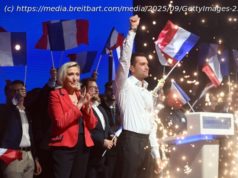Nationalism and realism are not merely the flavors of the day—they are the flavors of the century.
Vice President JD Vance’s speech Feb. 14 at the Munich Security Conference was not merely the most important speech the precocious young second-in-command has delivered in his political career. It was also a speech that encapsulates an entire geopolitical era—that of a return to prudence, sobriety, and nationalism as the hallmarks of American foreign affairs.
This departure from post-Berlin Wall universalist liberalism has been a long time in the making, and Vance’s incisive rebuke of European elites powerfully drove home the point. For the foreseeable future, U.S.-Europe relations will not be the same—and that is a good thing.
Vance took a blowtorch to delicate European elite sensitivities. He excoriated, among other things, Europe’s unfortunate recent turn toward serial censorship of perceived „dissident“ speech and its mass importation of third-world Muslims who show no discernible interest in assimilating into their host nations‘ dominant cultures. The diplomats assembled in Munich were, expectedly, aghast. One German official broke down in actual tears from the lectern. In truth, Vance was giving voice to the many Europeans who have been sending clear signals by voting for nationalist-populist anti-immigration parties everywhere from Britain to the old Iron Curtain.
But more than speaking for those Europeans, Vance was speaking as an American—and as a young American nationalist statesman, in particular. And it is here that we see how U.S.-Europe relations could be reset for a decade or more.
For the previous generation of American leaders, the notion of going into the belly of the European Union and delivering such a stern rebuke to high-ranking European statesmen would have been unthinkable. For Americans who came of political age during the Cold War, it was simply expected that the United States and Western Europe, specifically, would long be allied in lockstep fashion. After all, in contrast to the Soviet Union and other communist regimes, we shared the same values.
Vance’s speech underscored the growing chasm in those values.






